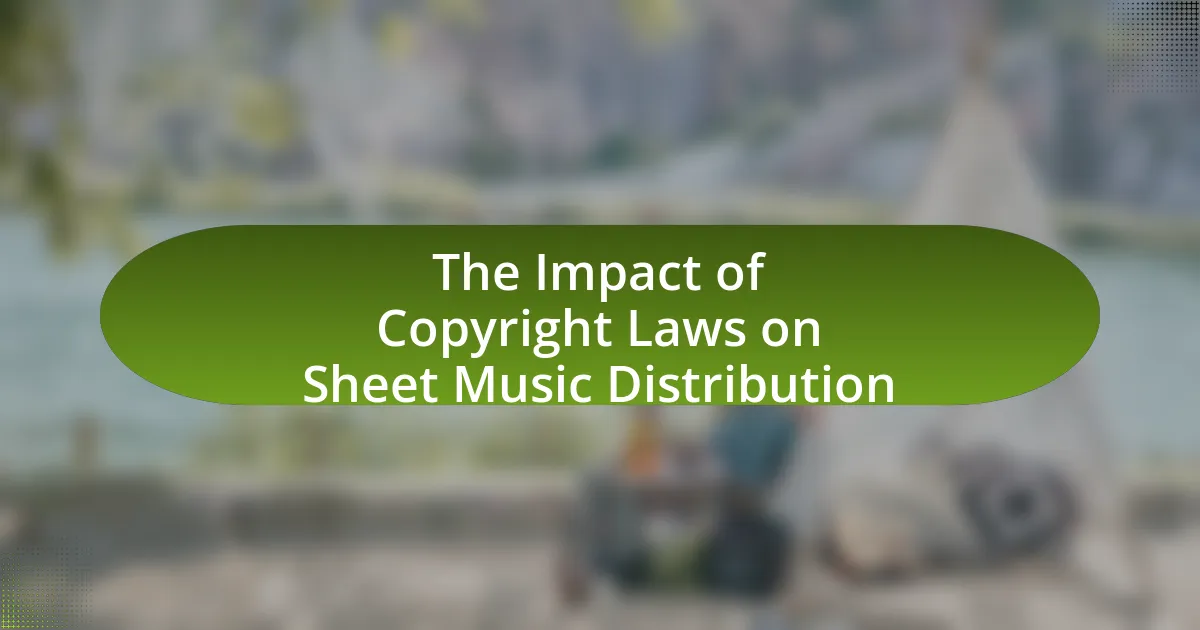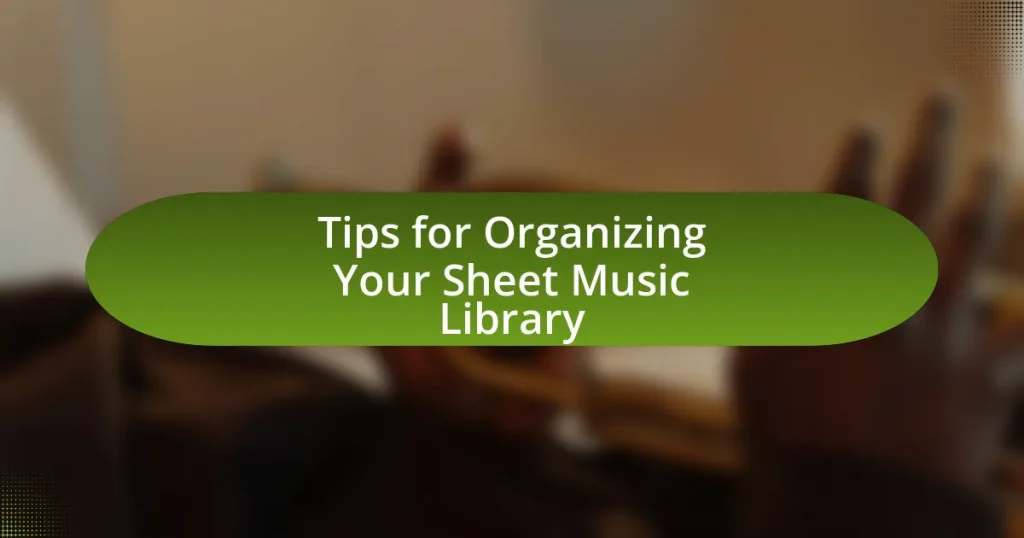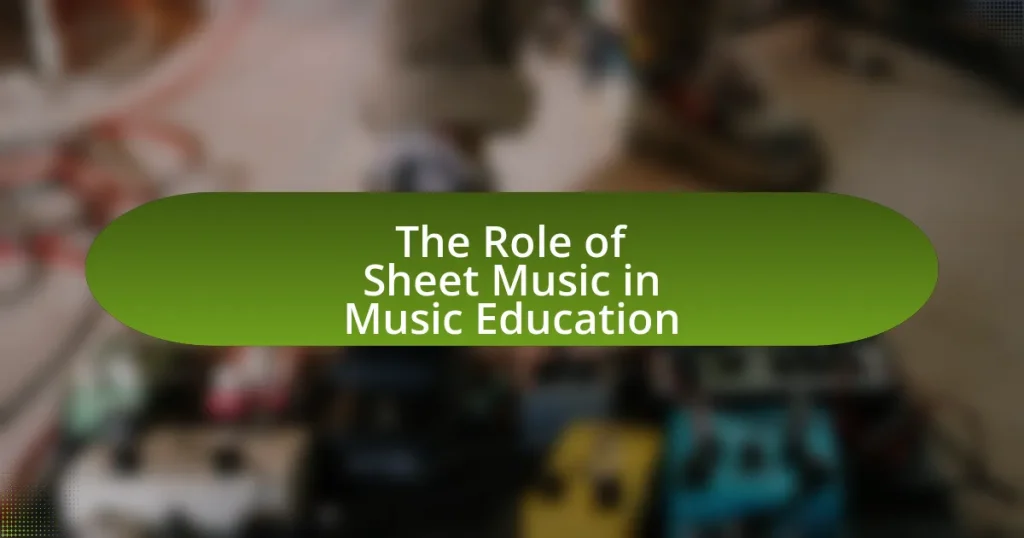Copyright laws are legal provisions that grant creators exclusive rights to their original works, including sheet music, ensuring protection of intellectual property and incentivizing creativity. This article examines the implications of copyright laws on sheet music distribution, detailing how these laws protect the rights of composers and publishers, the specific rights granted, and the economic sustainability they provide for musicians. It also addresses the challenges faced by independent musicians in navigating licensing agreements and the impact of digital distribution and piracy on the music industry. Additionally, the article outlines best practices for compliance with copyright laws and resources available for musicians to enhance their understanding of these regulations.
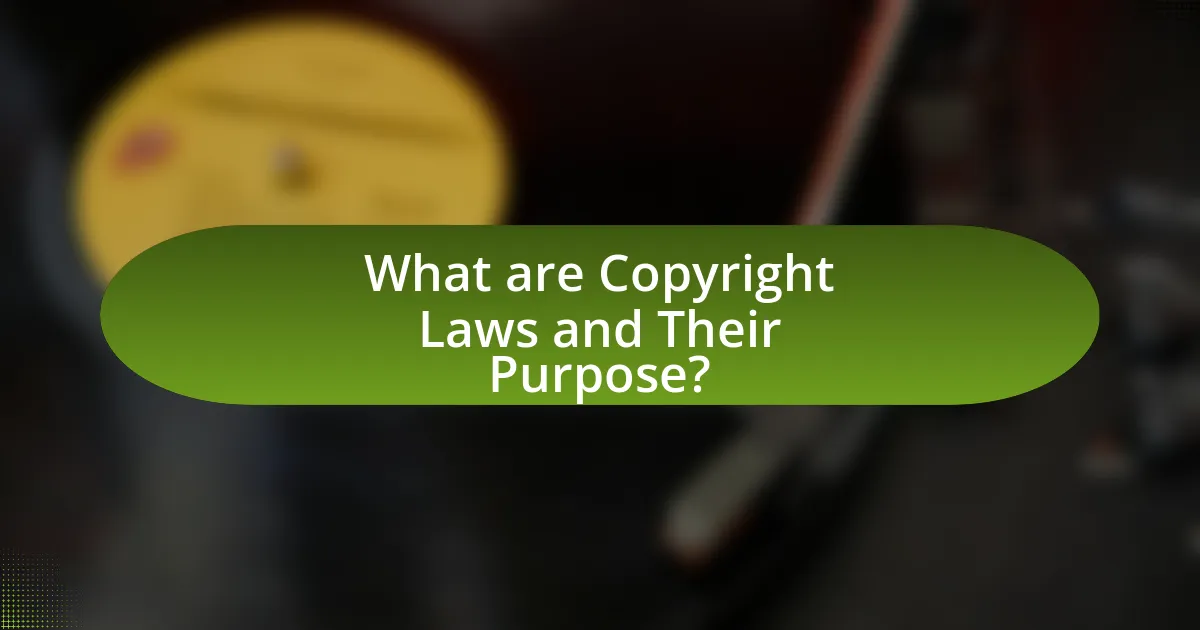
What are Copyright Laws and Their Purpose?
Copyright laws are legal provisions that grant creators exclusive rights to their original works, including music, literature, and art. The primary purpose of copyright laws is to protect the intellectual property of creators, allowing them to control the use and distribution of their works, thereby incentivizing creativity and innovation. For instance, under the U.S. Copyright Act of 1976, creators automatically receive copyright protection upon the creation of their work, which lasts for the life of the author plus 70 years. This legal framework ensures that creators can monetize their works and prevents unauthorized reproduction or distribution, which is particularly significant in the context of sheet music distribution, where unauthorized copies can undermine the financial viability of composers and publishers.
How do copyright laws apply to sheet music?
Copyright laws protect the rights of composers and publishers of sheet music, granting them exclusive rights to reproduce, distribute, and perform their works. Under the U.S. Copyright Act, sheet music is considered a literary work, and the copyright holder has the right to control how the music is used, including the ability to license it for public performance or reproduction. This legal framework ensures that creators receive compensation for their work and prevents unauthorized use, which is critical for the economic viability of music publishing. The duration of copyright protection typically lasts for the life of the author plus 70 years, after which the work enters the public domain, allowing free access and use.
What specific rights do copyright laws grant to composers and publishers?
Copyright laws grant composers and publishers exclusive rights to reproduce, distribute, perform, and display their musical works. These rights enable composers to control how their music is used and monetized, ensuring they receive compensation for their creative efforts. Specifically, the rights include the ability to license their works for public performance, create derivative works, and prevent unauthorized reproductions. This legal framework is supported by the Copyright Act of 1976 in the United States, which provides a foundation for protecting the intellectual property of creators in the music industry.
How do copyright laws protect the interests of musicians?
Copyright laws protect the interests of musicians by granting them exclusive rights to their original works, including the right to reproduce, distribute, and publicly perform their music. These laws ensure that musicians can control how their creations are used, preventing unauthorized use and allowing them to receive financial compensation for their work. For instance, the U.S. Copyright Act of 1976 provides musicians with the ability to license their music, which can lead to royalties from sales, streaming, and performances. This legal framework not only safeguards their creative output but also incentivizes further artistic development by ensuring that musicians can benefit economically from their contributions to the music industry.
Why are copyright laws important for the music industry?
Copyright laws are crucial for the music industry because they protect the intellectual property rights of creators, ensuring that artists receive fair compensation for their work. These laws prevent unauthorized reproduction and distribution of music, which is essential for maintaining the economic viability of the industry. For instance, according to the U.S. Copyright Office, music creators earn revenue through licensing, sales, and performance royalties, which are safeguarded by copyright protections. Without these laws, artists would face significant financial losses, leading to a decline in creativity and innovation within the music sector.
What role do copyright laws play in the economic sustainability of music creation?
Copyright laws are essential for the economic sustainability of music creation as they provide legal protection for creators, ensuring they receive compensation for their work. These laws grant exclusive rights to musicians and composers, allowing them to control the distribution and reproduction of their music, which in turn incentivizes further creativity and investment in new projects. For instance, the U.S. Copyright Act of 1976 established a framework that allows artists to earn royalties from sales, performances, and licensing, contributing significantly to their income. According to the Recording Industry Association of America, the U.S. music industry generated $12.2 billion in revenue in 2020, largely due to the enforcement of copyright protections that secure artists’ financial interests. Thus, copyright laws not only safeguard the rights of music creators but also foster a viable economic environment for ongoing music production.
How do copyright laws influence the distribution of sheet music?
Copyright laws significantly influence the distribution of sheet music by establishing the legal framework that governs the reproduction, distribution, and performance rights of musical works. These laws grant composers and publishers exclusive rights to control how their music is used, which directly affects how sheet music is made available to the public. For instance, under the U.S. Copyright Act, a composer retains rights for the life of the author plus 70 years, meaning that unauthorized reproduction or distribution of their sheet music can lead to legal consequences. This legal protection incentivizes creators to publish their works while also limiting access to their music unless proper licenses are obtained. Consequently, copyright laws shape the market dynamics of sheet music distribution, influencing pricing, availability, and the methods through which consumers can legally obtain music.
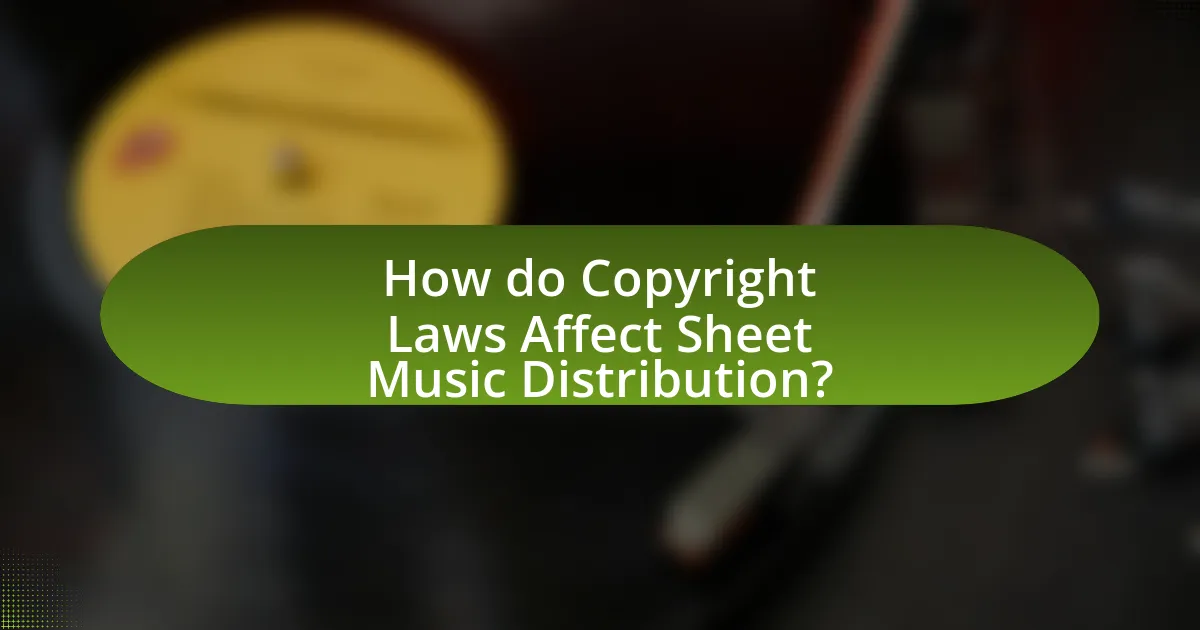
How do Copyright Laws Affect Sheet Music Distribution?
Copyright laws significantly regulate sheet music distribution by granting exclusive rights to composers and publishers, which restricts unauthorized reproduction and distribution. These laws ensure that creators receive compensation for their work, as unauthorized copies can lead to financial losses. For instance, under the U.S. Copyright Act, sheet music is protected for the life of the author plus 70 years, preventing others from distributing it without permission during this period. This legal framework supports the music industry by incentivizing the creation of new works while also establishing penalties for infringement, thereby shaping how sheet music is shared and sold in the market.
What are the implications of copyright infringement in sheet music distribution?
Copyright infringement in sheet music distribution can lead to significant legal consequences, including monetary damages and injunctions against further distribution. When individuals or entities distribute sheet music without proper authorization, they violate the rights of copyright holders, which can result in lawsuits. For instance, the U.S. Copyright Act allows copyright owners to seek statutory damages ranging from $750 to $30,000 per work infringed, and in cases of willful infringement, damages can escalate to $150,000 per work. Additionally, infringers may face reputational harm and loss of business relationships, as compliance with copyright laws is essential for maintaining trust within the music industry.
What are the potential legal consequences for unauthorized distribution?
Unauthorized distribution of copyrighted material, such as sheet music, can lead to significant legal consequences including monetary damages, injunctions, and statutory penalties. Copyright holders have the right to sue for infringement, which can result in the infringer being liable for actual damages suffered by the copyright owner or statutory damages ranging from $750 to $30,000 per work infringed, and up to $150,000 for willful infringement. Additionally, unauthorized distributors may face criminal charges, leading to fines and imprisonment in severe cases. These legal repercussions are enforced to protect the rights of creators and maintain the integrity of copyright laws.
How can musicians protect themselves from copyright infringement?
Musicians can protect themselves from copyright infringement by registering their works with the U.S. Copyright Office. This registration provides legal evidence of ownership and allows musicians to pursue legal action against infringers. Additionally, musicians should use copyright notices on their works, which inform others of their rights and deter unauthorized use. According to the U.S. Copyright Office, registration is essential for enforcing rights in court, as it establishes a public record of the copyright claim. Furthermore, musicians can utilize digital rights management (DRM) tools to control the distribution and use of their music online, thereby reducing the risk of unauthorized copying or sharing.
How do licensing agreements impact sheet music distribution?
Licensing agreements significantly impact sheet music distribution by determining the legal permissions required for reproduction and distribution. These agreements outline the rights granted to publishers and distributors, ensuring that composers and copyright holders receive compensation for their work. For instance, the requirement for a mechanical license allows publishers to distribute physical copies of sheet music, while synchronization licenses are necessary for using music in audiovisual projects. The enforcement of these agreements protects the intellectual property of creators, thereby influencing the availability and accessibility of sheet music in the market.
What types of licenses are commonly used for sheet music?
Commonly used licenses for sheet music include mechanical licenses, synchronization licenses, and performance licenses. Mechanical licenses allow the reproduction of a musical work in physical formats, such as CDs or digital downloads, and are typically obtained through organizations like the Harry Fox Agency. Synchronization licenses are required for pairing music with visual media, such as films or commercials, ensuring that the composer is compensated for the use of their work. Performance licenses grant permission for public performances of the music, which can be obtained through performance rights organizations like ASCAP or BMI. These licenses are essential for legal distribution and use of sheet music, ensuring that creators receive appropriate royalties.
How do licensing agreements facilitate legal distribution of sheet music?
Licensing agreements facilitate the legal distribution of sheet music by granting permission from copyright holders to publishers and distributors to reproduce and sell their works. These agreements ensure that creators receive compensation for their intellectual property, thereby encouraging the production and dissemination of music. For instance, the U.S. Copyright Act of 1976 allows for compulsory licensing, which means that once a song has been recorded and released, others can obtain a license to distribute the sheet music, provided they pay the required royalties. This legal framework not only protects the rights of composers and songwriters but also provides a structured method for the distribution of their works, ensuring that music can be shared and enjoyed while respecting copyright laws.
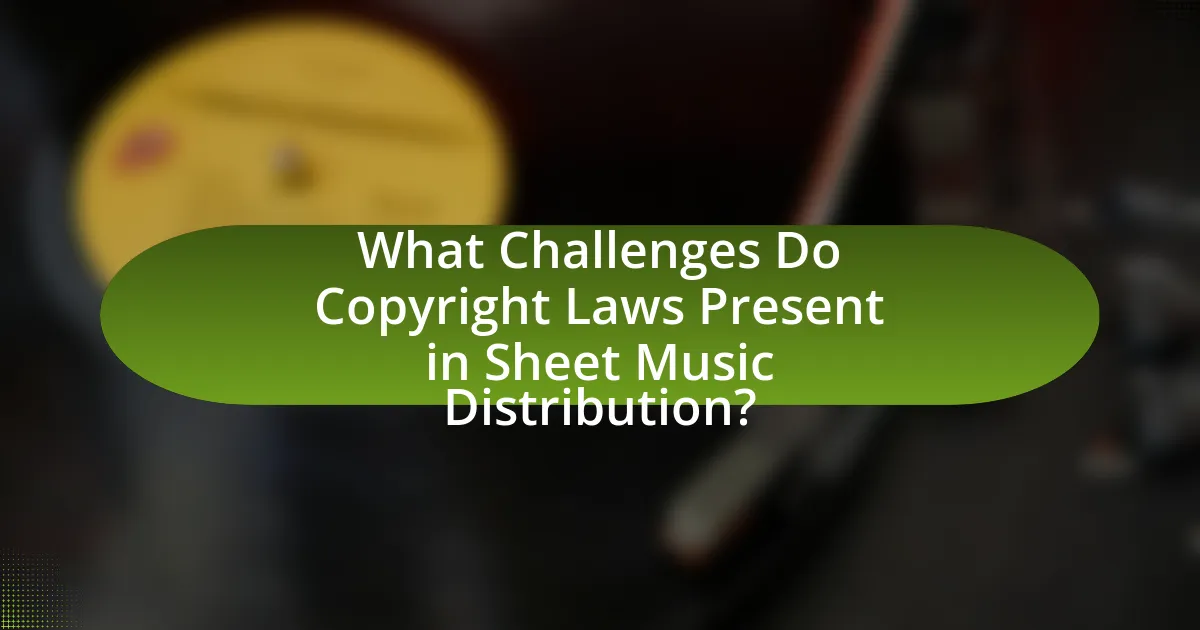
What Challenges Do Copyright Laws Present in Sheet Music Distribution?
Copyright laws present significant challenges in sheet music distribution by restricting the reproduction and distribution of copyrighted works without proper licensing. These laws require distributors to obtain permissions from copyright holders, which can be time-consuming and costly, often leading to limited access to a wide range of music. Additionally, the complexity of copyright ownership, especially with arrangements and adaptations, complicates the process further, as multiple rights holders may need to be consulted. According to the U.S. Copyright Office, the duration of copyright protection can extend up to 70 years after the death of the author, which can hinder the availability of older works for new arrangements or performances.
How do copyright laws create barriers for independent musicians?
Copyright laws create barriers for independent musicians by imposing restrictions on the use and distribution of their music, which can limit their ability to reach audiences and generate income. These laws often require musicians to obtain licenses for sampling, covers, or even public performances, which can be costly and complex, particularly for those without legal resources. For instance, the U.S. Copyright Office states that unauthorized use of copyrighted material can lead to significant financial penalties, discouraging independent artists from experimenting with their work or collaborating with others. Additionally, the lengthy process of securing permissions can delay the release of new music, hindering an independent musician’s ability to compete in a fast-paced industry.
What difficulties do independent musicians face in obtaining licenses?
Independent musicians face significant difficulties in obtaining licenses due to complex copyright laws and the high costs associated with licensing fees. The intricate nature of copyright regulations often leads to confusion regarding what permissions are necessary for various uses of music, such as sampling or public performance. Additionally, independent musicians may lack the financial resources to pay for licenses, which can be prohibitively expensive, especially for those just starting their careers. According to a 2021 report by the Future of Music Coalition, 70% of independent artists reported that the cost of licensing was a barrier to their ability to distribute music legally. This combination of legal complexity and financial burden creates substantial obstacles for independent musicians seeking to navigate the licensing landscape effectively.
How can independent musicians navigate copyright laws effectively?
Independent musicians can navigate copyright laws effectively by understanding their rights and utilizing available resources. They should familiarize themselves with the basics of copyright law, including the rights granted to creators under the U.S. Copyright Act, which protects original works of authorship, including music. Additionally, musicians can register their works with the U.S. Copyright Office to establish a public record of their ownership, which can be crucial in legal disputes.
Utilizing platforms like ASCAP or BMI for performance rights organization membership can help musicians manage licensing and royalties. Furthermore, independent musicians should consider using Creative Commons licenses to specify how others can use their music, providing clarity and legal protection. According to the U.S. Copyright Office, registering a work not only provides legal advantages but also allows for statutory damages and attorney fees in case of infringement, reinforcing the importance of proactive copyright management.
What are the challenges of digital distribution under copyright laws?
Digital distribution under copyright laws faces challenges such as the enforcement of rights, the complexity of licensing, and the risk of infringement. Enforcement of copyright can be difficult in the digital realm due to the ease of copying and sharing content online, which complicates the ability of copyright holders to protect their works. Additionally, the licensing process for digital distribution often involves navigating multiple rights holders, which can lead to confusion and delays in obtaining necessary permissions. The risk of infringement is heightened as users may inadvertently share or distribute copyrighted material without proper authorization, leading to potential legal repercussions. These challenges create significant barriers for creators and distributors in the sheet music industry, impacting their ability to monetize their works effectively.
How do copyright laws adapt to the digital landscape of music distribution?
Copyright laws adapt to the digital landscape of music distribution by incorporating provisions that address online sharing, streaming, and digital downloads. These adaptations include the implementation of the Digital Millennium Copyright Act (DMCA) in the United States, which provides a framework for copyright protection in the digital environment, allowing copyright holders to enforce their rights against unauthorized use of their music online. Additionally, international treaties like the Berne Convention and the WIPO Copyright Treaty have been updated to ensure that copyright protections extend to digital formats, thereby reinforcing the rights of creators in the face of evolving distribution methods.
What are the risks of digital piracy for sheet music distribution?
Digital piracy poses significant risks for sheet music distribution, primarily undermining the financial viability of composers and publishers. When sheet music is illegally shared or downloaded, it leads to lost revenue, as creators do not receive compensation for their work. According to a 2019 report by the International Confederation of Music Publishers, the global music publishing industry lost approximately $1 billion due to piracy, which directly affects the ability of publishers to invest in new works and support artists. Additionally, digital piracy can dilute the perceived value of sheet music, making consumers less willing to pay for legitimate copies. This erosion of market value can stifle creativity and innovation within the industry, ultimately harming the ecosystem that supports music creation and distribution.
What best practices should musicians follow regarding copyright laws?
Musicians should register their original works with the U.S. Copyright Office to protect their rights and ensure legal recognition. This registration provides a public record of ownership and is necessary for pursuing legal action against infringement. Additionally, musicians should include copyright notices on their sheet music and recordings, which serve as a deterrent against unauthorized use. They must also understand the fair use doctrine, which allows limited use of copyrighted material without permission under specific circumstances, such as criticism or education. Furthermore, musicians should keep detailed records of their compositions and any agreements made regarding licensing or distribution, as this documentation can be crucial in disputes. By adhering to these practices, musicians can safeguard their creative works and navigate the complexities of copyright laws effectively.
How can musicians ensure compliance with copyright laws in their distribution efforts?
Musicians can ensure compliance with copyright laws in their distribution efforts by obtaining the necessary licenses for their music. This includes securing mechanical licenses for reproducing and distributing recordings, as well as synchronization licenses for using music in visual media. According to the U.S. Copyright Office, failure to obtain these licenses can result in legal repercussions, including fines and the potential for litigation. Additionally, musicians should register their works with a copyright office to establish legal ownership and facilitate enforcement of their rights. By adhering to these practices, musicians can effectively navigate copyright laws and protect their creative works during distribution.
What resources are available for musicians to understand copyright laws better?
Musicians can access several resources to better understand copyright laws, including the U.S. Copyright Office website, which provides comprehensive information on copyright registration, protection, and infringement. Additionally, organizations like the American Society of Composers, Authors and Publishers (ASCAP) and the Broadcast Music, Inc. (BMI) offer educational materials and workshops focused on copyright issues relevant to musicians. Furthermore, legal textbooks such as “Copyright Law for Dummies” and online courses from platforms like Coursera and Udemy cover copyright law basics tailored for musicians. These resources collectively equip musicians with the knowledge needed to navigate copyright laws effectively.
